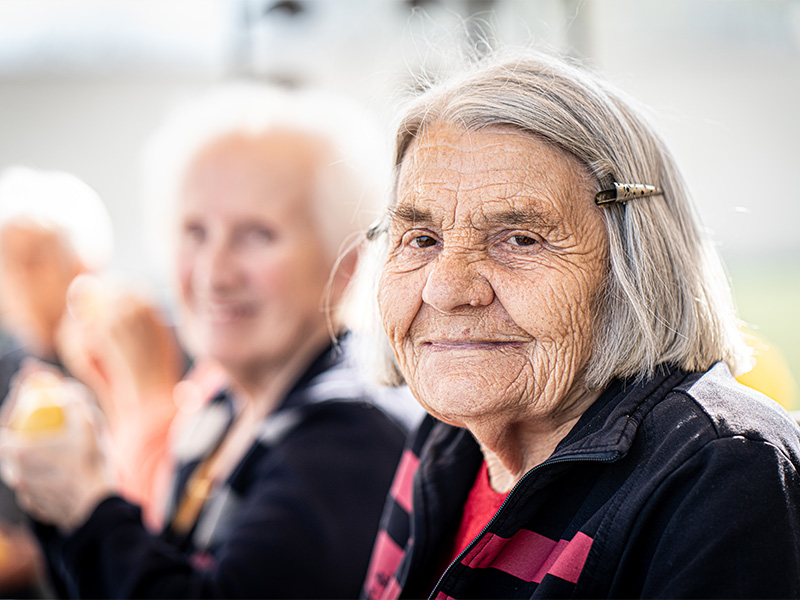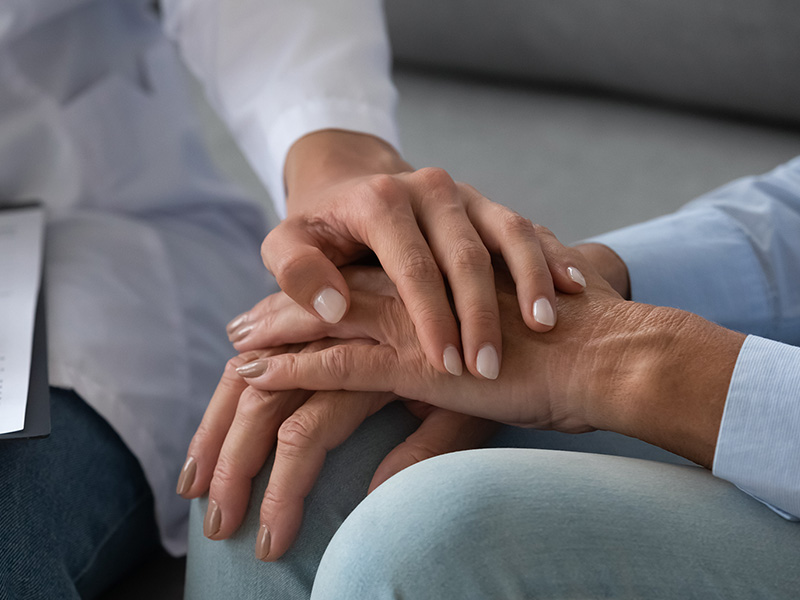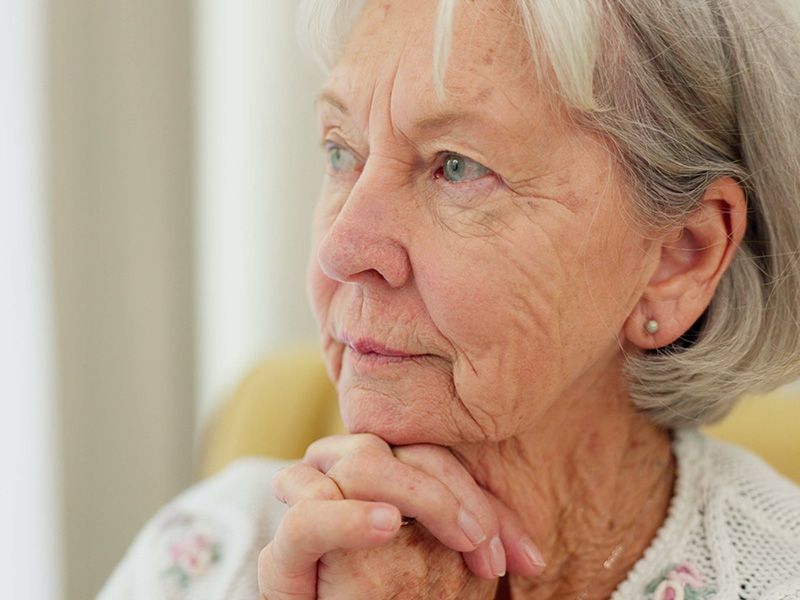
Holocaust Survivors
Today, over 140,000 Holocaust survivors live in the State of Israel. Most survivors have managed to rebuild their lives, establish families, engage in meaningful work, and contribute to society and the state. At AMCHA, we consider it a great privilege to provide them with mental health treatment and social support, so they can enjoy good and fulfilling lives.
Against the background of their exposure to extreme traumatic situations in the past, Holocaust survivors tend to experience sleep disturbances, anxiety, depression, and difficulties coping with life transitions and crises. They often feel existential loneliness. In addition, aging is accompanied by new losses of relatives and friends, physical limitations, weakness, and dependence on others. All these factors cause emotional distress. At AMCHA, we can help survivors cope better and improve their quality of life, even in complex situations.
Child Survivors
About half of the Holocaust survivors living today experienced the Holocaust in their youth as children or adolescents.
Today, we know that Holocaust child survivors emotionally experienced the terror of war with great intensity, despite their young age, or more accurately, especially because of being young and dependent on their parents.
According to their age, they dealt with separations and traumatic events at different levels of cognitive and emotional development. Clear memories don't always remain, but the traumatic childhood and especially the wounds of separation from parents and family members are imprinted on them to this day.
Many Holocaust children were separated from their families and survived in monasteries, with stranger families, in hiding, moving from place to place, or were sent to other countries. Some had to learn to hide their Jewish identity to survive under a false identity. Questions of identity, loneliness, longing, and anxieties occupy them throughout their lives. Memories of lost childhood resurface in Holocaust child survivors, sometimes accompanied by insecurity and confusion about their identity.
However, most had the impressive ability to build new and normal lives for themselves, and they generally handled life's tasks with great success. But the emotional deficits they overcame during years of work and creation have resurfaced, against the background of their retirement and additional losses they experience in old age such as loss of spouses and friends, loss of physical and cognitive abilities, and more.
AMCHA assists this population through individual mental health treatments and through various frameworks of group therapy, therapeutic social clubs, volunteer services, and documenting their life stories.


The second generation of the Holocaust
In Israel, over a million people live as second-generation Holocaust survivors and other family members of survivors. The sons and daughters of survivors, born after the Holocaust, did not directly experience its horrors, but the impact of their parents' trauma is evident in them to varying degrees. Nevertheless, most function well and manage to live full and meaningful lives.
The second generation grew up in the shadow of the Holocaust. The memory was imprinted on them through a complex process of "intergenerational transmission" of their parents' traumas throughout their lives. This group includes people whose coping in all areas of life is normal or even high, but also those who struggle to cope with their experiences as children of survivors. In light of their parents' aging and the difficulties in caring for them, and even after the parents' death, second-generation survivors can greatly benefit from personal therapy and/or connection with other second-generation individuals.
Third-generation survivors and other relatives of survivors who need counseling, support, or treatment are also encouraged to contact Amcha.
Characteristics of the Second Generation of Holocaust Survivors:
Many second-generation survivors carry the burden of needing to compensate their parents and fulfill their high expectations in their personal choices. They feel a heavy responsibility for their parents' fate and find it particularly difficult to cope with their aging.
There are unique characteristics of second-generation Holocaust survivors. These characteristics include difficulties in the separation-individuation process from their parents, an increased tendency towards anxiety, and sometimes experiences of depressive feelings and psychosomatic complaints.
How can psychological treatment help second-generation Holocaust survivors?
Some second-generation survivors struggle with anxieties, persistent guilt feelings, and many emotional dilemmas. Their emotional coping is complex not only because of the traumas and losses their parents experienced in the Holocaust but also or especially in light of their parents' current aging.
This is where emotional and supportive treatment for the second generation comes in, allowing for emotional processing and alleviating the effects of intergenerational transmission.
Trauma Victims
Over the years, therapists at Amcha have specialized in treating Holocaust survivors and the effects of massive trauma throughout the life cycle. We make our professional experience available to the entire population who have experienced traumatic events in the past or present.
Life in Israel today is filled with unrest and insecurity, and we are often exposed to difficult events that undermine our mental and physical security.
Amcha is an active member of the Israeli Trauma Coalition. We engage in direct treatment for trauma and anxiety victims, and provide training in preparation for emergency situations and assistance in dealing with these situations.
What is Post-Traumatic Stress Disorder?
It's a mental injury that occurs following exposure to a traumatic event, where there was a real or perceived danger to life or physical or mental integrity. Even if the danger didn't materialize - for example, an accident without casualties - the event can change the entire mental mechanism. An event can become particularly traumatic if it happened unexpectedly and was uncontrollable.
This involves a complex mechanism: The response to a traumatic event while it's happening is usually helplessness or extreme fear - this is of course a normal and correct response of the body and mind. However, in certain cases, this response becomes fixed and continues even after the event ends, creating Post-Traumatic Stress Disorder. The symptoms can last for many years after the actual event has ended and disrupt the entire course of life.
Post-Traumatic Stress Disorder belongs to the realm of anxiety disorders and is characterized by a recurring experience of the traumatic event that creates arousal and alertness, along with attempts to avoid the recurrence of the experience.
Symptoms of the recurring experience: Nightmares, intrusive memories, feeling of re-experiencing the event, flashbacks. Excessive bodily arousal, sleep difficulties, alertness, and nervousness.
Symptoms of avoidance: Avoiding situations that might trigger anxiety - meeting certain people, objects, places associated with the traumatic memory, avoiding actions related to the event. Sometimes also feelings of depression, lack of energy, and helplessness.

How is Post-Traumatic Stress Disorder treated?
Amcha's therapists have gained extensive experience over the years in treating victims of prolonged and acute trauma. We make our therapeutic and clinical experience available to the entire population.
Cognitive-Behavioral Therapy - Exposure to the traumatic memory, changing thought patterns related to post-trauma, such as lack of belief in oneself and the world, and changing avoidant behavior through gradual exposure to things associated with the traumatic event, in a controlled attempt to overcome the aversion to them.
Some of Amcha's therapists are experts in specific trauma treatment methods such as EMDR, SOMATIC EXPERIENCING, PROLONGED EXPOSURE, and other methods.
Psychodynamic Therapy - Especially suitable when the trauma was massive and prolonged, traumatic events occurred at a young age or in childhood, and when there's a need to deal not only with post-traumatic symptoms, but also to process the meaning of the trauma and its implications, such as aspects of loss, and complex feelings of depression, guilt, shame, and anger.
Medication - Antidepressants help in many cases of post-trauma.
Relaxation Techniques - Since many of the symptoms are related to the sense of arousal created by the traumatic experience, it's sometimes recommended to learn relaxation techniques.
Art Therapy - Many post-trauma victims find relaxation and comfort in various arts, especially painting therapy and bibliotherapy. Art therapy treatment is particularly effective in cases of post-trauma among children and the elderly.

Mental care for the elderly
After many years of experience treating the Holocaust survivor population, we at Amcha have gained extensive experience in treating the elderly. We make this experience available to the general population.
The proportion of elderly people in the general population is growing. This group, for the most part, now enjoys a longer life expectancy and a better quality of life.
We believe in the significant contribution of mental health treatment in the third age.
Older adults and elderly people can benefit from mental health treatment no less than younger people.
Our services include:
- Mental health treatment – Psychotherapy - Mental support services and counseling in areas typical of coping in the third age:
- Health and functional deterioration
- Losses and coping with grief
- Late effects of traumatic life events
- Cognitive decline and dementia
- Conflicts between family members caring for the elderly person
- Help and support for family members caring for the elderly, to prevent burnout
- Preservation and promotion of quality of life in old age
- We can help you and your elderly parents!


